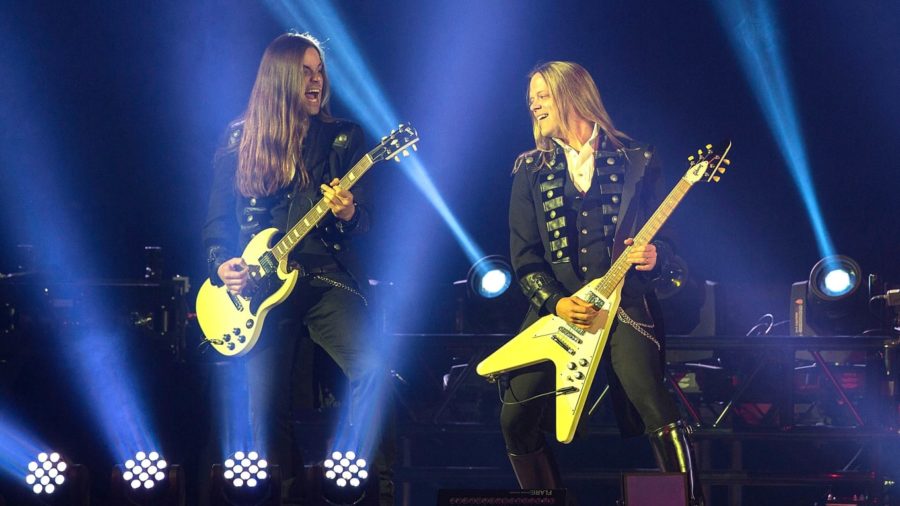TSO – Christmas Eve and Other Stories
November 29, 2021
Paul O’Neill created the Trans Siberian Orchestra, or TSO, in 1996, and in that same year, the TSO released their debut album, Christmas Eve and Other Stories. I remember falling in love with the band and their unique, pyrotechnic approach to celebrating Christmas 20 years later when I had the incredible opportunity to see their concert at the Moda Center in 2016. Naturally, I felt attached to O’Neill in particular once I’d seen what all had been created based on his ideas, which meant I was hesitant to see the TSO in concert again in 2019 after their founder passed away in 2017. However, I am extremely grateful to my parents for convincing me to attend the concert with them after all because as I recall there were no fewer lasers the second time around than there were the first, and the music was most definitely equally powerful, the second time I heard it live. I cannot wait to attend yet another Trans Siberian Orchestra concert this month and to see what they’ll do differently to celebrate their debut album’s 25th birthday.
Christmas Eve and Other Stories includes rocking and rolling instrumental interpretations of classic Christmas songs such as “O Come All Ye Faithful” and “O Holy Night.” One of the stories told by the album is that of Mary and the baby Jesus and the three wise men, and their story is conveyed in part by the aforementioned instrumentals and in part through the TSO originals “Good King Joy” and “Prince of Peace.” “Good King Joy” is bookended by an electric guitar-centric rendition of “Joy to the World,” which would be awesome all by itself, but the spoken-word lyrics in between describing the thoughts and actions of the three wise men make it even better. As is common among Trans Siberian Orchestra songs the singer’s passion and enthusiasm increase with each verse, so when he declares that “All at once the past, it doesn’t mean a thing” he sounds significantly more impassioned than he does when he describes the three wise men’s “old camel with some fancy tents.” However, I dearly love both of these lyrics, the one about the camel because it’s just the right amount of irreverent and the other because it’s meaningful no matter how exactly you interpret it.
The album also contains instrumental pieces inspired by those in The Nutcracker or by Ukrainian folk music and one which is as far as I can tell entirely original. “Christmas Eve/Sarajevo 12/24” sounds similar to the more commonly known “Carol of the Bells,” although if you listen closely it also contains elements of the melody of “God Rest Ye Merry Gentlemen.” Paul O’Neill and two of his colleagues assembled their song in honor of an elderly man who at the height of the Bosnian War returned home to Sarajevo so that he could play his cello atop a pile of rubble at the city’s center in order to prove that the human spirit could persevere. O’Neill evidently wanted to prove the same even though the conflicts he faced were much different from the cellist’s. “Christmas Eve/Sarajevo 12/24” might just be a headbanger in many people’s minds, but having read and reread and memorized the story behind it I now feel more like crying whenever I hear it on the radio around Christmas time. Fortunately, Christmas Eve and Other Stories is also home to “First Snow,” an instrumental song that is truly just great fun to listen to at any time of year.
Christmas Eve and Other Stories also puts its listeners through the emotional turmoil of listening to a father describe his relationship with his daughter falling apart and being put back together. This vignette occurs over the course of three songs, beginning with the heartbreaking “Ornament.” “Ornament” is from the father’s perspective, and it primarily conveys his regrets, especially via the chorus lines: “All of those words that we brought into play, no longer matter, I should have known back then, I just know you’re far away.” Throughout the album, Christmas is used as a metaphor for many different forces of nature, and I believe that this song is used in place of a more traditional god, as “Ornament” concludes with the command “Come Christmas, stay Christmas… There in your arms, she’ll be, until the day when you bring her back home to me.” In other words, the song still concludes with a feeling of hope on the singer’s part.
“Old City Bar” is another spoken-word style song, this time tearjerking as all get out not only because it foreshadows the daughter’s return home, but also because it gives credit where credit is due to all of the people who aided her in her return trip. It describes the bartender who spends the only money he is known to have in order to get the daughter into a cab and then onto a flight, very intentionally mentioning how “he thought no one saw when he took all the cash from the register drawer.” “Old City Bar” also explicitly states its two beautiful broader messages: “If one could be home they’d be already there” and “This world, you can change it… to know who needs help, you need only just ask.”
The father/daughter vignette concludes with one of the most uplifting songs I’ve ever heard, “This Christmas Day.” Its first two verses express a reluctance to believe in people’s capacity for love and kindness toward one another outside of the Christmas season for fear of being disappointed, but music and lyrics alike make a 180 degree turn between the second and third verses. “This Christmas Day” includes the lines, “For of all the dreams you were the first I knew, and every other one was a charade of you, you stayed close when I was far away” and although it is unclear whether the singer is addressing his daughter or Christmas itself it is a heartwarming series of words which has made me feel better on many a lonely day.
Seemingly tying together the story of the baby Jesus and the story of the girl returning home thanks to the bartender’s generosity is the story of the unnamed angel told by the first song on the album, “An Angel Came Down,” and the last of the songs with lyrics, “An Angel Returned.” For the most part, I like the instrumentation and the passion behind the vocals in these songs more than I do the lyrics themselves, except in the case of the phrase “kyrie among nations,” which for those who’ve not spent their entire high school careers singing choral music roughly translates to “mercy among nations.” It’s a call for an end to war, which means “An Angel Returned” is in fact connected to “Christmas Eve/Sarajevo 12/24” as well.
In short, Christmas Eve and Other Stories is a concept album and a rock opera, and when you see it performed live the Trans Siberian Orchestra includes all the trappings: multicolored laser beams, poofs of smoke and flame, the heat from which you can feel from your seat, and a narrator with an excellent voice taking you through the tales in between the songs and truly tying everything together. Tying everything together is what the Trans Siberian Orchestra’s been about since its founding when Paul O’Neill named the band after the train which connects all of the cold, desolate parts of Russia to the rest of society throughout the lonely winter because in O’Neill’s mind life would be cold and desolate and lonely without music, the greatest source of connection between people.





































































































































